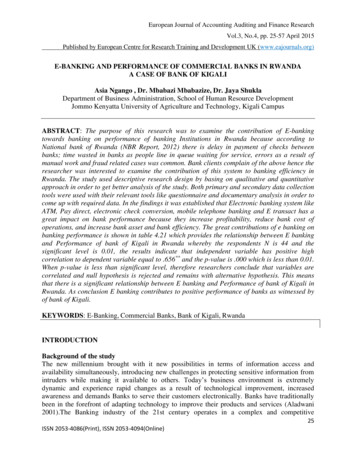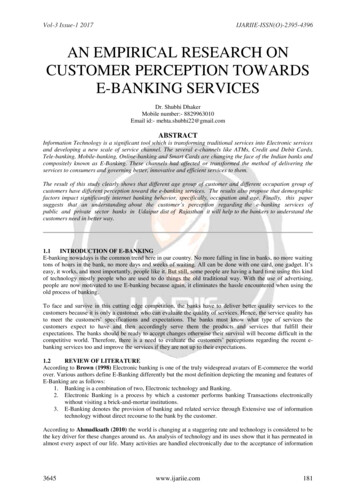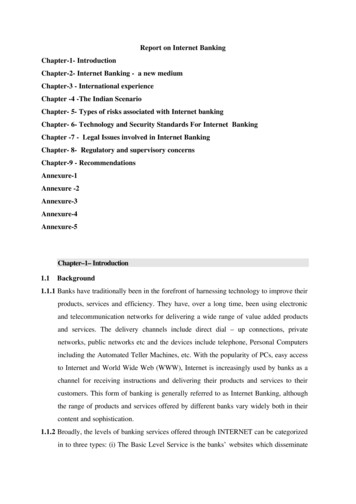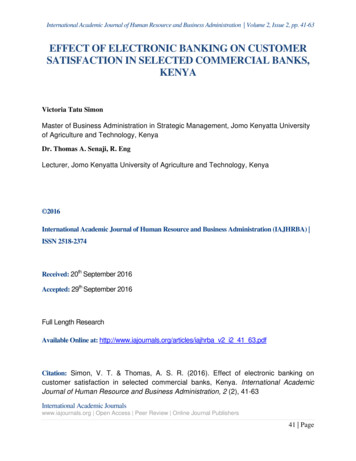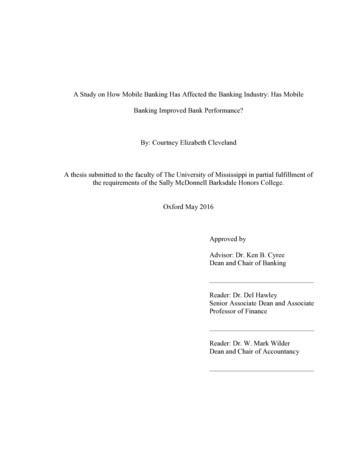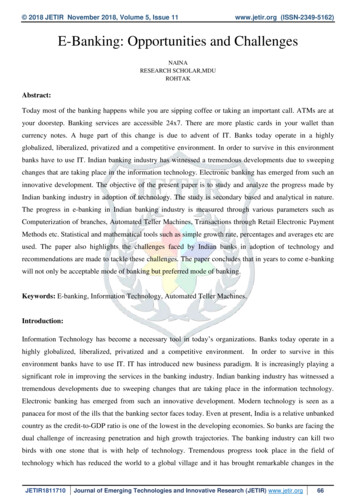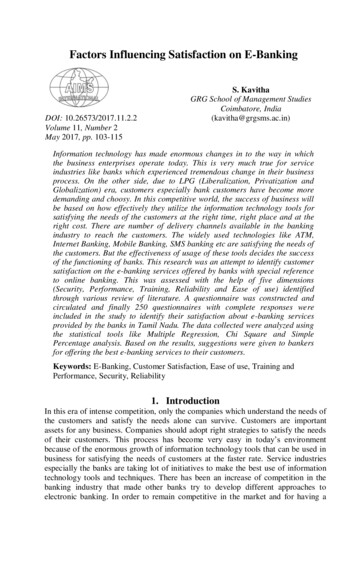
Transcription
International Journal of Managerial Studies and Research (IJMSR)Volume 7, Issue 2, Febuary 2019, PP 19-27ISSN 2349-0330 (Print) & ISSN 2349-0349 04www.arcjournals.orgImpact of E-Banking on the Development of Banking Sector inNigeriaDr. Abbas Umar Ibrahim1*, Dr. Cross Ogohi Daniel21Department of Business Administration, Nile University of Nigeria, Abuja, Nigeria2Departments of Public Administration/Banking and Finance, Nile University of Nigeria, Abuja, Nigeria*Corresponding Author: Dr. Abbas Umar Ibrahim, Department of Business Administration, NileUniversity of Nigeria, Abuja, NigeriaAbstract: Automation through computer network has become a necessity in the world of banking today thusthis research work sets out to investigate the impact of electronic banking in the development of Nigerianbanking sector. Electronic banking has become a very important and indispensable too1 for the presentsurvival and growth of financial institutions considering the dramatic increase in the number of banks inNigeria in recent years. The methodology of the study as discussed in Chapter three it comprises of theresearch and questionnaire design, data collection and data analysis techniques. The Main research question,Research questions and Questions were used in the course of this research work. After a thoroughinvestigation, it was discovered that electronic banking has both negative and positive impact in the Nigerianbanking sector. While it has greatly improved service delivery on the positive angle but on the negative side, itis prone to electronic fraud and unauthorized access to information.Keywords: E-banking, Development, and banking1. INTRODUCTIONThe new millennium brought with it new possibilities in terms of information access and availabilitysimultaneously, introducing new challenges in protecting sensitive information from some eyes whilemaking it available to others. Today’s business environment is extremely dynamic and experiencerapid changes as a result of technological improvement, increased awareness and demands Banks toserve their customers electronically. Banks have traditionally been in the forefront of harnessingtechnology to improve their products and services.The Banking industry of the 21st century operates in a complex and competitive environmentcharacterized by these changing conditions and highly unpredictable economic climate. Informationand Communication Technology (ICT) is at the centre of this global change curve of E-bankingSystem in Nigeria today. Assert that they have over the time, been using electronic andtelecommunication networks for delivering a wide range of value added products and services,managers in Banking industry in Nigeria cannot ignore Information Systems because they play acritical impact in current Banking system, they point out that the entire cash flow of most fortuneBanks are linked to Information System.In this work study, I intend to trace the historical development of competition in the Nigeria bankingsector by considering the services rendered by banks especially between the pre and the postconsolidation era. There is a paradigms shift in the types of services rendered by the Nigeria banksshortly after consolidations. The competition witness among banks has been a factor in relation to theservices delivery. The era of universal banking became operational and more visible after theN25billion minimum capital base for Nigerian banks. The banking reform which stipulated a minimumcapital of N25billion in 2004 brought about merger and acquisition, raising capital from the capitalmarket, as well as foreign direct investment into the banking sectors. This made them to be operatingbetween N50 and N100 billion capital bases. A good number of them became diversified in theirservice delivery and move on to become a global player.However, some observers still believes that there are factors that influence bank customers‟preferences. This study would look critically at banking services delivery in the financial sector andInternational Journal of Managerial Studies and Research (IJMSR)Page 19
Impact of E-Banking on the Development of Banking Sector in Nigeriathe factors that influence customer’s patronage of a bank.in Nigeria. I would also consider the factorsinfluencing bank consolidation on the services render by banks to their customers and how it hastranslated into success story to some of the banks. The bank is a financial institution set-up purposelyfor safekeeping of money, valuable goods and documents like wills and gold. It collects surplus fundsfrom the general public, safeguards them and makes them available to the true owner when requiredand loans out fund (at interest) to those who need them (Obi 2002). In a nutshell, a bank is aninstitution engaged in safekeeping of monies, issuing drafts, and giving loans on interest to those whoare in need of such.The statutory functions of bank become more complex because of the complex nature of businessactivities and the increase in demand and number of customers, as well as the competitive nature ofbanking industry (Irechukwu, 2000). This made the bank to look inward to customer oriented serviceswhich will enhance efficient and effective customer services, Again, the business of banking is nolonger perceived as merely the generation of deposit, liabilities and creation of liquid assets, but ratherthe generation, storage, manipulation, communication and application of financial information.E- Banking is a process of transacting banking operations electronically. It is a process of usingelectronic devices in carrying out banking operations. E banking does away with most visits to thebank. It is a state-of-the-art-service that is just beginning to take off among banking customersespecially in Nigeria. Indeed E-banking has the major potential for future development as it allowscustomers to do most of the things they do at the bank like make balance enquiries, payment, transferof funds, pay bills over the internet. It also offers banking services outside of normal opening hours. Infact, it has effectively “opened” banks for business twenty-four hours a day, seven days a week(Rubino 2000).With the proliferation of the internet, coupled with the world increasingly addicting to e-business, thetrend of cash transactions is now giving way to electronic payment system. This growing acceptance ofthe digital lifestyle, as stated in Salehi and Alipour (2010), has brought a significant transformation incustomers’ expectations from their financial service providers. According to Offei and Nuamah(2016), customers are now seeking for a faster and convenient technology with more rewardingbanking experience.Perceived Usefulness (PU) and Perceived Ease of Use (PEOU) are two factors mentioned in Davis’sTechnology Acceptance Model (TAM) that influences users’ decision to use a particular technologysystem (Surendran, 2012), users will eventually lose interest in e-banking if they feel that it is nolonger useful even if the system is somewhat easy to handle (Obiri et al., 2013). Therefore banks thatfail to respond to the emergence of e-banking in the market are likely to lose their customers (Salehiand Alipour, 2010); Lee (2009) stressed that its adoption seem not to be yielding the anticipatedresults, thereby creating a gap between the actual returns and its proposed objectives.Besides the high cost of transactions and epileptic network connections associated with e-bankingsystem in Nigeria, the introduction of e-banking into banking operations brought an increase both inthe volume of deposits, as well as fraudulent practices (Agwu and Carter, 2014). Even with the aim ofusing it to decongest banking halls, these halls are most of the time still full with customers. If thesesituations are not dealt with accordingly, it could result into some negative consequences since themore active customers are with their electronic transactions the more profitable it is for the banks anda dis-satisfied customer leaves an organization with negative word of mouth publicities about theorganization (Agwu and Carter, 2014).According to Agwu and Murray (2014), this optimal integration of all the activities of a bank throughthe deployment of modern information technology is based on bank process and in accordance withthe organizational structure of banks. Therefore, e-banking employs the use of informationcommunication technology to drive banking business for immediate and future goals, hence for thebanks, it is a strategic weapon used in achieving competitive advantage and increasing their marketshare (Agwu and Murray, 2015).2. STATEMENT OF THE PROBLEME-banking is a driving force that is changing the landscape of the banking environment fundamentallytowards a more competitive industry. E-banking has blurred the boundaries between differentfinancial institutions, enabled new financial products and services, and made existing financialservices available in different package, but the influences of e-banking go far beyond this.International Journal of Managerial Studies and Research (IJMSR)Page 20
Impact of E-Banking on the Development of Banking Sector in NigeriaThe developments in e-banking together with other financial innovativeness are constantly bringingnew challenges to finance theory and changing people’s understanding of the financial system. It isnot surprising that in the application of e-banking in Nigeria, the financial institutions have to face itsproblems: - Communication over the internet is insecure and often congested, The financialinstitutions would also have to contend with other internet challenges including insecurity, quality ofservices and some aberrations in electronic finance and Besides, the existing banking environmentalso possesses some challenges to the smooth operations of e-banking in Nigeria. Some of theseoperational challenges include; Epileptic power supply, dominance of cash transaction in theeconomy, low level of awareness among Nigerian etc. The thrust of this research work shall be toexamine the impact of e-banking on the development of Nigerian banking sector.3. OBJECTIVE OF THE STUDYThe general purpose of the study is to examine the impact of e-banking on the development ofNigeria banking sector. Specifically, the objectives aimed are as follows: To evaluate the prospects of e-banking in Nigerian banking environment. To examine the impact of e-banking on the operations of financial institutions4. RESEARCH HYPOTHESESThe following alternate hypotheses will be used for the study:H1: There are prospects of e-banking in Nigeria banking environment.H2: There are impacts of e-banking on the operation of financial institutions5. LITERATURE REVIEW5.1. Conceptual Framework on E-BankingAnyanwuocha (2004) defined bank as a financial institution that provides banking and other financialservices. Bank is generally understood as an institution that holds a banking license. The bankinglicense is granted by financial supervisor authorities to conduct the most fundamental bankingservices such as accepting deposits and making loans available to their numerous customers.E-banking is a kind of banking that involves electronic form of money transaction. Here bankingservices are fully automated such that transactions are concluded in a jiffy. It involves the use ofcomputer network in dispensing cash and transfers of fund. The primary objectives are to replaceintensive labour operation and thus help reduce the waiting time of customers. For now in Nigeria, ebanking is limited to the automated teller machine and electronic funds transfer. It also includeselectronic devices such as SQL and MICR. The emergence of e-banking products brings to an end theera of mechanical and laborious banking.E-banking means not only electronic production, like, for instance, opening a letter of credit, but alsothe customer requests the services by electronic means and that the bank supplies it the very sameway. In banking operations, technical change encompasses the marketing and distribution function inaddition to production. Having defined e-banking, we now in the next section consider various ebanking products existing within and outside the Nigerian's Financial System.Like many other sectors, banking has been suffering changes due to development and improvementsin ICT (Onodugo, 2015), which has been a useful tool to follow market demands and practices. Thisdevelopment of new technologies has been causing a huge impact on organizations in terms ofmanagement and control, marketing and research, operations and decision making (Onodugo, 2015).Banking technology is not a new topic. It has been a constant presence in the literature since the late1980s and early 1990s.E-banking can be defined as a set of activities conducted from home instead of a physical banklocation (Obiri et al, 2013). It is an “umbrella term for the process by which a customer may performbanking transactions electronically without visiting a bricks-andmortar institution. E-banking can bealso referred to as online banking, cyber banking, virtual banking and net banking (Obiri et al, 2013).Moreover, there are three types of e-banking: internet banking, phone banking and mobile banking,that differ in terms of distribution channel, internet, phone and mobile phone, respectively.International Journal of Managerial Studies and Research (IJMSR)Page 21
Impact of E-Banking on the Development of Banking Sector in NigeriaAccording to Onodugo (2015), e-banking is not something totally new. It started some time ago inthe form of ATMs and telephone transactions. This first generation of solutions typically onlyallowed customers to view their statements online, conduct transfers between accounts and pay bills(Obiri et al, 2013). Nowadays, the amount of operations that can be carried out using e-bankingservices is far greater. Customers can use e-banking to: pay utility bills and insurance premiums; fundtransferences; consult current account and savings balances; carryout mortgage payments; optionssubscriptions; book orders online; book flights and railway tickets; and, purchase products online.5.2. Impact of E-bankingThe emergence of e-banking in the Nigerian financial system is partly to keep pace with moderntechnologies applicable to modem banking. More importantly, it is being used as a competitive toolby banks. Conscious of the need to satisfy the sophisticated customers, banks introduced theseproducts in order to reduce human errors. They also aim at reducing the waiting time of customers aswell as reducing human labour and paper work involved before customers are attended to. So theimmediate impact of ATM is that we should begin to see a substantial reduction in the queues thatoften develop at the bank counters. Banks would thereby have more time to devote to strategicplanning thus increasing the efficiency of the average bank worker.ATM customers now enjoy the benefit of banking, customers now enjoy 24 hours services, in whichcase weekend banking will be unnecessary as soon as ATM is able to accept deposits and giveaccount balances. Also as more banks acquire ATM, we expected to see fewer bank customersholding on to large cash particularly at weekends. This would ultimately reduce the volume of moneyin circulation.5.3. Advantages of E-bankingThe transition to e-banking, as opined in Chemtai (2016) offers major opportunities in terms ofcompetitive advantage. Specifically, it provides banks with the opportunity to develop a stronger andmore durable business relationship with their customers. For instance, it makes access to finance frombanks attractive with funds appearing to be much more available (Salehi and Alipour, 2010), andcustomers are given the opportunity to conduct banking transactions with great peace of mind and attheir convenience (Offei and Nuamah-Gyambrah, 2016).Before the introduction of e-banking, transactions took a lot of time to execute and this was tiring.Now, services are rendered quicker with transactions much more accurate hereby saving time, as wellas reducing human errors and clerical overhead cost. Some other benefits derived from e-banking areincreased customer satisfaction, expanded product offerings and extended geographic reach. Thesehave helped to attract more customers since the level of satisfaction is high and also helped toconserve the energy of employees therefore giving them the opportunity to put in their best into theroles they have to play in the bank. The advantages of e-banking can thus be summarized intoincreased bank development (Chemtai, 2016), increased comfort and timesaving, quick andcontinuous access to information, better cash management (Salehi and Alipour, 2010) and improvedcustomer experience (Onodugo, 2015).5.4. The Development of E-banking in NigeriaBanking services development in Nigeria as a side-line to other commercial activities of ElderDempster Sector. According to available information, the first real bank in Nigeria was the AfricanBanking Corporation founded in 1892. In 1894, Bank of British West African Banking Corporationwhich called the bank of West African on Nigeria’s Independence and later called the Standard Bankof Nigeria Limited and subsequently changed its name to First Bank of Nigeria Ltd now Plc. hadcomplete monopoly of business in the banking industry until the establishment in 1917 of the colonialbank. The Colonial Bank opened branches in Jos, Kano, Lagos and Port Harcourt. In 1952 the bankchanged its name to Barclays Bank DCO and is now called Union Bank of Nigeria Plc.Indigenous participation in the Banking Industry started in 1929 with the establishment of theIndustrial and Commerce Bank by a group of Nigerian and Ghanaian Entrepreneurs. The Bank failedin 1930 due to inadequate capital, poor management, hostile and unfair competition from the foreignestablished banks. Undaunted by the failure of the first attempt at establishing an indigenous bank,another group of entrepreneurs, this time all Nigerians among whom were the late Dr. A. Maja, ChiefInternational Journal of Managerial Studies and Research (IJMSR)Page 22
Impact of E-Banking on the Development of Banking Sector in NigeriaT. A. Doherty and Late H. A. Subair established the Nigerian Merchant Bank in 1933. The bank wasmore successful than its predecessor, but like it, also failed in 1936.Meanwhile the same group of indigenous pioneers in field of banking had established in 1993 theNational Bank of Nigerian Limited, which was to make history by being the first indigenous bank tosurvive though with some few problems to the 1952 Banking Ordinance. The success of NationalBank Limited through careful management by the Western Regional Government inspired otherNigerians to go into banking business and in 1945, Chief Okupe established the Agbonmagbe bank.As a private enterprise it thrived. It thus became the fourth indigenous bank to be established. It alsosurvived though it ran into difficulties in 1967, it was saved by the Western Nigerian DevelopmentCorporation (WNDC), later IICC and now Odua Investment Corporation who took over its operationsand changed its name to Wema Bank Limited. The Nigerian Penny Bank was the fifth indigenousbank to be established but it packed up operations with disastrous consequences to depositors soonafter registration in 1946.In 1946, Dr.Azikiwe established the Tinubu Bank to serve the Zik Group of the Companies, whichwas established in 1941 called Tinubu Properties Ltd. The name of the bank was changed to theAfrican Continental Bank in 1947 with its first office in Yaba. In 1949, another foreign bank, Britishand French Bank was established. The bank was re-established in 1961 by a consortium of fiveforeign banks. Since then it has been known as the United Bank for African (UBA). In order to havefurther insight into the history and development of the Banking industry in Nigeria, from theestablishment of the first in 1892 to date, it will be convenient to drive the period into three distincteras.5.5. The Challenges and Limitations of E-bankingAutomation is very expensive venture more so in Nigeria where infrastructure and support facilities(like dedicated line called "lease lines" from NITEL) are virtually non-existent. It must beremembered that hardware cost represent only a fraction of the overall cost of an automation project.On the other hand potential benefits of automation are usually very subjective and not easily verified.Any recommendation therefore to automate must be very well thought out and the true impact of allexpenditures involved in the automation plan must be clearly communicated to users. Management inthe feasibility or other report presented for consideration. Automation also involves a lot ofexpenditures to retailer and customers who want to install personal computers.The cost considerationmust include the following: Hardware -generators, air conditioning, communication equipment Software - operation system and application programs – Stationery Conversion Training - data processing staff, implementation staff and user staff Maintenance of both hardware and software’sAnd again, there is tendency to dorge the cost of keeping the system riming at all times and in an upto date fashion. Another challenges or limitation to e-banking in Nigeria is the official red-tapism inthe banking system of operation. For instance, quite numbers of banks that render on-line-real-timeservices still maintain anachronistic policies such as not allowing cashiers to dispense across thecounter, cash beyond a certain sum. In some banks a cashier cannot honour a cheque that is aboveS500 or S1, 000 without getting authorization or over-lapping of a supervisor. Consequently, longqueues still thrive in such banks, rendering meaningless the computerization effort.Furthermore, banks should be selective in the choice of candidates for ATM because fraud can easilybe perpetrated through it. Such restriction is also 46 whatever you feed into the computer is what itrolls out (Garbage in, Garbage out) Though some errors are inadvertent, there are cases of wrongprogramming by operators with the intent to defraud. This again leads to the legal implications ofelectronic form of banking. Although customers are warned on the need to keep safe their ATM cardand personal identification numbers, this is likely to be abused in future.What therefore is the bank's legal position when a customer's account is debited in error and when afraud is perpetrated on the account using ATM? In the first instance, when a customers' account isInternational Journal of Managerial Studies and Research (IJMSR)Page 23
Impact of E-Banking on the Development of Banking Sector in Nigeriadebited in error, the bank is at fault and it must take appropriate action to mitigate injuries that couldbe suffered by the customer. The other hand if a fraud is perpetrated without the knowledge of thecustomer this may involve the bank in unnecessary and avoidable litigation since such debits aredifficult to prove.6. METHODOLOGYThis study focuses on the impact of e-banking on the development of Nigerian banking sector. Nodoubt, it will be practically difficult to cover all organizations in this study. The scope covers amortgage bank in Wuse, Abuja, namely Infinity Trust Mortgage bank.From a total of ninety two (92)copies of the questionnaire distributed to the respondents, eighty (80) copies representing 87% wereduly completed and returned while (12) copies representing 13% were not returned. The questionnairewas designed in Likert scale format. The researchers conducted a pre-test on the questionnaire toensure the validity of the instrument. Pearson product moment correlation coefficient was used to testthe hypotheses7. TEST OF HYPOTHESESHI: There are prospects of e-banking in Nigeria banking environment.H0: There are no prospects of e-banking in Nigeria banking environment.Table1. Table of correlation between effective e-banking and banking sectorCorrelationse-banking Pearson CorrelationSig. (2-tailed)Nlevel of banking sector Pearson CorrelationSig. (2-tailed)NeffectiveEffective e-banking1200.536 **.00080level of banking sector.536 **.000801200**. Correlation is significant at the 0.01 level (2-tailed).According to above calculations it is observed that amount of correlation coefficient between level ofdevelopment and effective banking sector is equal to 53.6 per cent and considering that a significantlevel is less than 5%. Then we can say that there is a positive relationship between effective e-bankingand banking sector. This implies that one percent increase in effective e-banking will lead to 53.6%increase in level of banking sectorTable2. Regression analysis test of level of banking sector and e-bankingModel SummaryModel1R.965aR Square.716Adjusted R Square.586Std. Error of the Estimate3.79952a. Predictors: (Constant), effective e-bankingRegression coefficient of R .965 or 96.5% indicate that relationship exist between independentvariables and dependent variable. The coefficient of determination R2 0.716 which show that 71.6%of variation in level of banking sector explained by effective e-banking. The adjusted R-square in thetable shows that the dependent variable, (level of banking sector) is affected by 58.6% by independentvariable (effective e-banking). It shows that effective e-banking is responsible for level ofdevelopment for the banking sector.Table3. CoefficientsaModel1(Constant)effective e-bankingUnstandardized CoefficientsBStd. Error12.310.9011.056.085Standardized CoefficientsBeta.536t13.65612.426Sig.002.000a. Dependent Variable: level of banking sectorThe coefficient of determination for effective e-banking is positive (1.056) and is highly significant(0.001) in ensuring level of development. The p-value of 0.000 is less than the t-statistic value ofInternational Journal of Managerial Studies and Research (IJMSR)Page 24
Impact of E-Banking on the Development of Banking Sector in Nigeria12.426 and the standard error value of 0.085. This implies that a unit increase in effective e-bankingwill lead to 1.056 increases in level of development. Therefore, the null hypothesis is rejected andalternative hypothesis accepted that there is a relationship between the effective e-bankingon thedevelopment of Nigeria and the level of banking sector.Hypothesis twoH2: There are impacts of electronic banking on the operation of financial institutionsH0: There are no impacts of electronic banking on the operation of financial institutionsTable4. Table of correlation between e-banking and improving in the banking sectorCorrelationsPearson Correlatione-bankingSig. (2-tailed)Nimproving the banking Pearson CorrelationsectorSig. (2-tailed)Ne-banking1200.473 **.00080improving the banking sector.473**.000801200**. Correlation is significant at the 0.01 level (2-tailed).According to above calculations is observed that amount of correlation coefficient between e-bankingand improving in the banking sector is equal to 47.3 per cent and considering that a significant level isless than 5%. Then we can say that there is a positive relationship between e-banking and improvingin the banking sector. This implies that one percent increase in e-banking will lead to 47.3% increasein improving in the banking sectorTable5. Regression analysis test of e-banking and development in NigeriaModel SummaryModelR.773 a1R Square.624Adjusted R Square.722Std. Error of the Estimate3.96426a. Predictors: (Constant), e-bankingRegression coefficient of R .773 or 77.3% indicate that relationship exist between independentvariables and dependent variable. The coefficient of determination R2 0.624 which show that 62.4%of variation in improving the banking sector is explained by e-banking. The adjusted R-square in thetable shows that the dependent variable, (improving the banking sector) is affected by 72.2% byindependent variable (e-banking). It shows that there are positive impacts of e-banking on improvingthe banking sector.Table6. ed CoefficientsBStd. Error15.036.8061.319.125Standardized CoefficientsBeta.473t18.64410.520Sig.000.000a. Dependent Variable: improving the banking sectorThe coefficient of determination for e-banking is positive (1.319) and is highly significant (0.000) inimproving in the banking sector. The p-value of 0.000 is less than the t-statistic value of 10.520 andthe standard error value of 0.125. This implies that a unit increase in e-banking will lead to 1.319increases in improving in the banking sector. Therefore, the null hypothesis is rejected and alternativehypothesis that there are positive impacts of e-bankingon improving in the banking sector.8. CONCLUSIONSBased on the findings made, the following conclusions were made:There is a great increase in the numbers of commercial bank customers with the adoption of e bankingservices. At least the quality of services rendered to customers has improved greatly. Customers aresatisfied with some of the e banking service offered to bank customers; however, a lot needs to bedone to improve the customer service in the Country. There are benefits that customers accrued fromInternational Journal of Managerial Studies and Research (IJMSR)Page 25
Impact of E-Banking on the Development of Banking Sector in Nigeriathe utilization of e-banking by commercial banks in Nigeria. This has promoted social, economic, andpolitical development of the state.Commercial banks were faced with a lot of problems in the provision of e-banking to customers in thestate. These problems needed to be tackled in order to enhance effective and efficient customerservices. Finally, commercial banks would grow tremendously, if the proprietors can invest more onthe information technology to boast their daily banking operations.9. RECOMMENDATIONSThe researcher undertook an empirical investigation o
banking is limited to the automated teller machine and electronic funds transfer. It also includes electronic devices such as SQL and MICR. The emergence of e-banking products brings to an end the era of mechanical and laborious banking. E-banking means not only electronic production, like, for instance, opening a letter of credit, but also
